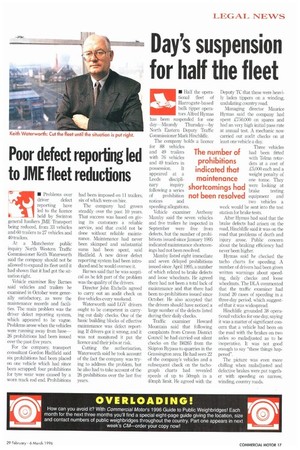Day's suspension for half the fleet
Page 19

If you've noticed an error in this article please click here to report it so we can fix it.
• Half the operational fleet of Harrogate-based bulk tipper operators Alfred Hymas has been suspended for one day--Maundy Thursday—by North Eastern Deputy Traffic Commissioner Mark Hinchliffe.
The company holds a licence for 88 vehicles and 49 trailers with 76 vehicles and 49 trailers in possession. It appeared at a Leeds discipli nary inquiry following a series of prohibition notices and speeding allegations.
Vehicle examiner Anthony Mamby said the seven vehicles and five trailers he inspected in September were free from defects, but the number of prohibitions issued since January 1995 indicated maintenance shortcomings had not been resolved.
IVIamby listed eight immediate and seven delayed prohibitions issued since April 1995, a number of which related to brake defects and loose wheelnuts. He agreed there had not been a total lack of maintenance and that there had been no prohibitions issued since October. He also accepted that the drivers should have noticed a large number of the defects listed during their daily checks.
Traffic examiner Howard Mountain said that following complaints from Craven District Council he had carried out silent checks on the B6265 from the Skipton Bypass to quarries in the Grassington area. He had seen 22 of the company's vehicles and a subsequent check on the tachograph charts had revealed speeds of up to 50mph in a 40mph limit. He agreed with the
Deputy TC that these were heavily laden tippers on a winding, undulating country road.
Managing director Maurice Hymas said the company had spent £750,000 on spares and had an very high initial pass rate at annual test. A mechanic now carried out audit checks on at least one vehicle a day.
Three vehicles had been fitted with Telma retarders at a cost of £5,000 each and a weight penalty of one tonne. They were looking at brake testing equipment and two vehicles a week would be sent into the test station for brake tests.
After Hymas had said that the brake defects had arisen on the road, Hinchliffe said it was on the road that problems of death and injury arose. Public concern about the braking efficiency had never been higher.
Hymas said he checked the tacho charts for speeding. A number of drivers had been given written warnings about speeding, daily checks and loose wheelnuts. The DIA commented that the traffic examiner had found 20 cases of speeding in a three-day period, which suggested that it was widespread.
Hinchliffe grounded 38 operational vehicles for one day, saying it was a matter of significant concern that a vehicle had been on the road with the brakes on two axles so maladjusted as to be inoperative. It was not good enough to say "these things happened".
The picture was even more chilling when maladjusted and defective brakes were put together with speeding on narrow, winding, country roads.




































































































